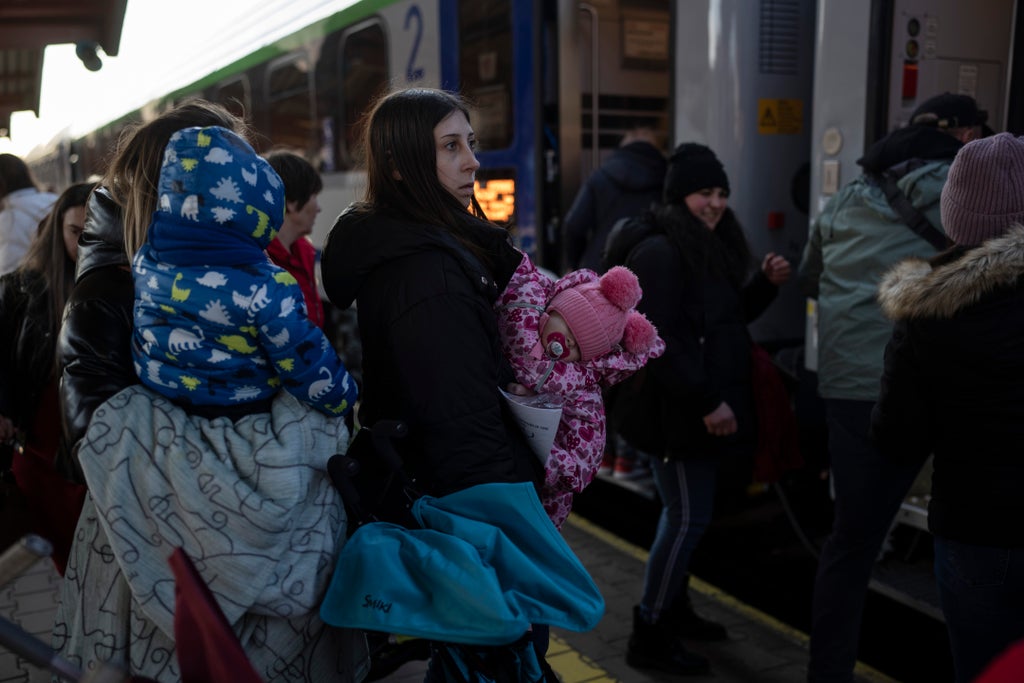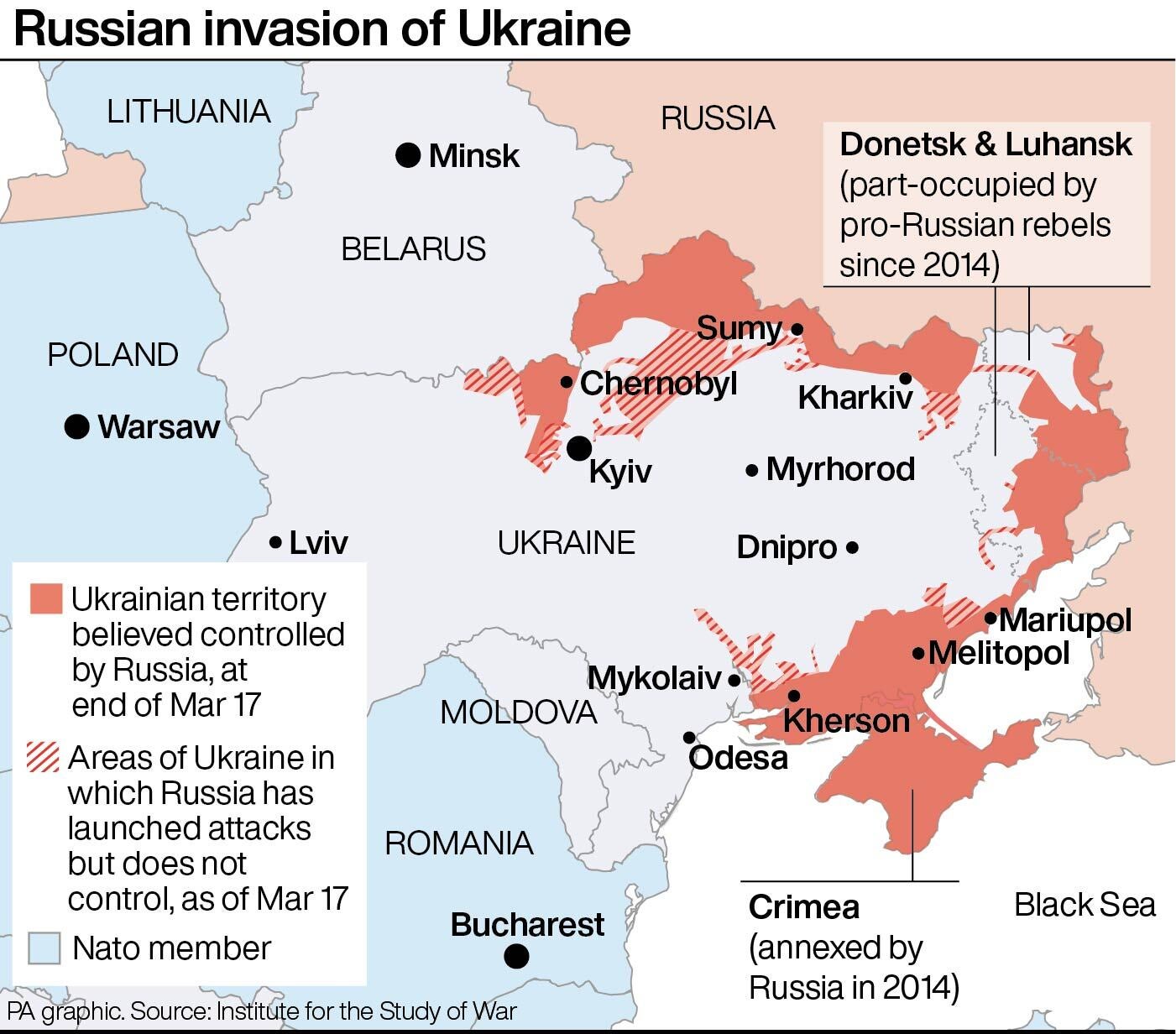
Vladimir Putin’s brutal invasion of Ukraine has seen the Russian military subject the neighbouring state’s border cities to relentless shelling campaigns over the last three weeks, slowly but surely reducing the likes of Kharkiv and Mariupol to rubble.
Undeterred by near-unanimous international condemnation and draining economic sanctions, Mr Putin urges his forces on, with international observers accusing Russia of committing war crimes by deliberately going after civilian targets like residential apartment blocks and hospitals in order to cause panic, with even children’s nurseries, a Holocaust memorial and a theatre caught up in the siege warfare so far.
Russia’s progress has been greatly slowed by the resistance put up by the Ukrainian people while their president, Volodymyr Zelensky, has become a hero around the world, admired for his dogged leadership from the streets of Kyiv, tirelessly rallying his citizens and calling on the international community to do more to help.
The other aspect of the war has been the onset of the biggest humanitarian crisis Europe has seen since the Second World War.
According to the United Nations High Commissioner for Refugees (UNHCR), as of Friday 18 March, no fewer than 3,270,662 people have fled the Ukraine since the onset of hostilities on Thursday 24 February.

The vast majority of displaced people have headed West, crossing the borders of Ukraine’s neighbouring states like Poland, Romania, Moldova, Hungary and Slovakia while others have made it further afield into Europe.
Matthew Saltmarsh of the the UN Refugee Agency said on Friday the number of crossings into Poland had dropped by around 50 per cent from its peak of 100,000 a day but warned it could quickly pick up again should Russia begin to target the western city of Lviv, which has so far largely escaped the violence.
Of those who have already arrived in Poland, Mr Saltmarsh said they were showing signs of sustained trauma, adding: “Many of them don’t have a plan. Those who arrive are not clear where they can go.”
Irina Bogdaniuk, 24, newly arrived in Medyka from Sumy, said of the conditions in the region she had fled: “There is no water, there is no electricity, there is no food… children are crying, it is cold and scary.”
The Polish town of Rzeszow, some 62 miles from the Ukrainian border, is being used as a humanitarian hub by the UN, where emergency supplies like food, blankets, solar lamps, warm clothing, mattresses, jerry cans and plastic sheeting are being stockpiled in warehouses, with the fighting still too hostile in places like Mariupol to enable delivery of the goods to those who need them most.
Here is the UNHCR’s latest data on the countries that have taken in the most asylum seekers escaping the conflict:
- Poland 1,975,449
- Romania 508,692
- Moldova 355,426
- Hungary 291,230
- Slovakia 234,738
- Russia 184,563
- Belarus 2,127
Figures from other nations are less readily available and less precise, being dependent on what estimates the interior ministries of their respective governments make available.
The Czech Republic’s prime minister Petr Fiala said on Thursday that his country had taken in 270,000 asylum seekers from Ukraine and the German government announced on Friday that it had taken in 197,000.
Elsewhere, Italy’s interior ministry said more than 50,000 displaced people had arrived as a result of the crisis, the majority settling in Bologna, Milan, Rome and Naples.
Bulgaria’s PM Kiril Petkov has said that his country has taken in approximately 78,000 Ukrainian refugees so far, around 37,000 of whom he expects to stay, while Estonia has accepted another 23,886, of which 17,819 are expected to stay.
French interior minister Gerard Darmanin meanwhile told BFM TV on Wednesday morning that around 17,000 Ukrainian refugees had arrived on French soil fleeing the war.
In the UK, Boris Johnson’s administration has been pilloried for its shambolic response to the crisis so far, although the application process for the Homes for Ukraine initiative announced by levelling up secretary Michael Gove finally launches on Friday, enabling British citizens to make their spare rooms available to Ukrainian refugees.
More than 150,000 people had already signalled their interest in advance, a commendable gesture of generosity given that many questions about the exact nature of the “matching” process and the knock-on effects of participating remain unanswered.
Mr Johnson said at the start of this month that the UK could potentially accommodate up to 200,000 refugees from Ukraine.
The Independent has a proud history of campaigning for the rights of the most vulnerable, and we first ran our Refugees Welcome campaign during the war in Syria in 2015. Now, as we renew our campaign and launch this petition in the wake of the unfolding Ukrainian crisis, we are calling on the government to go further and faster to ensure help is delivered. To find out more about our Refugees Welcome campaign, click here. To sign the petition click here. If you would like to donate then please click here for our GoFundMe page.







